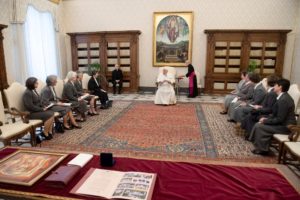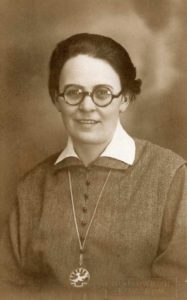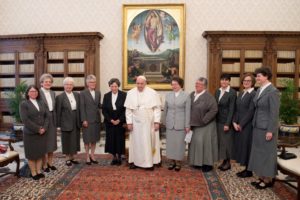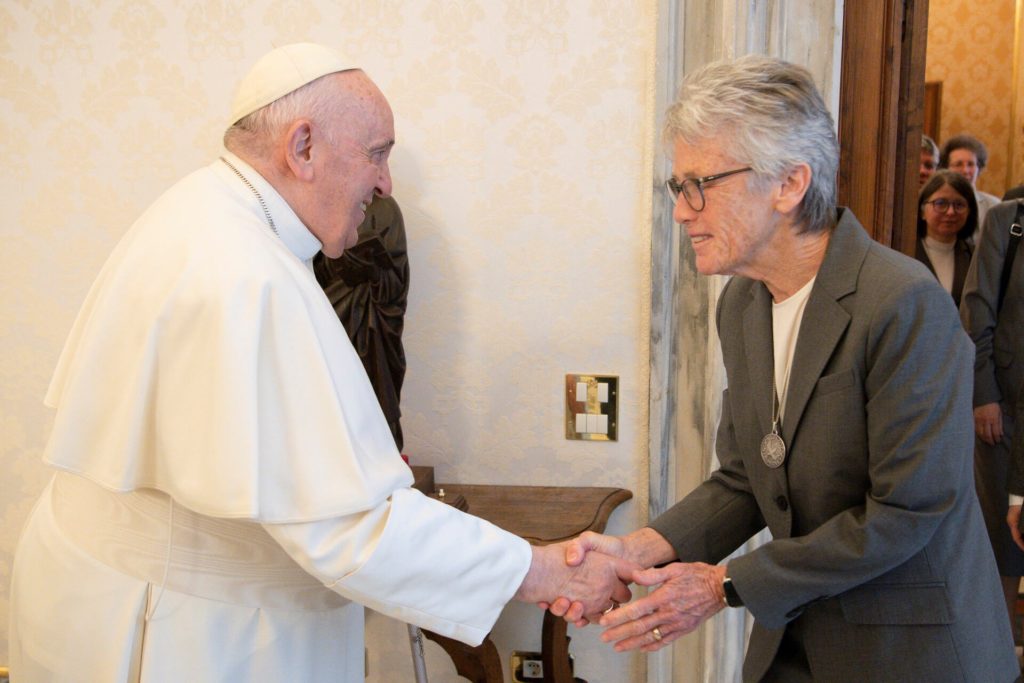“Tutti, tutti! That means everyone. Everyone!”
This was Pope Francis’ refrain as he met with 10 members of the Sisters of Social Service last month to mark the beginning of the order's 100th jubilee year.
The word “tutti” — a reference to the pope's latest encyclical “Fratelli Tutti” (“Brothers All”) — resonated deeply with the delegation of sisters, whose work is rooted in serving the poor and marginalized.
Sister Maribeth Larkin, general director of the order’s Los Angeles branch, was among those who attended the 30-minute private audience, held Jan. 20 in the library of the Vatican’s Apostolic Palace.
“We discussed how ‘Fratelli Tutti’ was so meaningful to us,” she said. “As Christians, we are brothers and sisters to everyone. We don’t get to pick and choose who we’re going to be charitable towards or who we’ll give service to.”
Larkin described their meeting as “a powerful, intimate connection,” saying how struck she was by how humble and approachable Pope Francis was. “He stood at the door and greeted each of us individually, shaking our hands and thanking us for coming,” she said.

And although he had prepared a formal statement to read aloud, the pope changed his mind at the last minute. “I don’t want to start with a statement, I want to start with our conversation!” he told them in Italian.
It was a gesture that reflected his “powerful simplicity,” Larkin recounted. “There is nothing aloof about him.”
Pope Francis and the sisters discussed the order’s struggles and accomplishments through the decades, the challenges facing the Church today, and the importance of social justice in transforming the world.
He also complimented the practical way they dress — in simple, gray suits. “He said … ‘You’re right there with people to see what their needs are and to respond to those needs — to establish the kind of relationship of love that drives what being charitable is about,’ ” recalled Larkin.
Along with its charisms of service and charity, the order is committed to political ministry, striving to improve social systems to better help the poor and disenfranchised. The order’s founder, Hungarian nun Sister Margaret Slatchta, was a pioneer in the field of social work and a fearless political activist who advocated for vulnerable women and children. After she formed the order in 1923 in Budapest, the Sisters of Social Service became well known throughout Hungary and Eastern Europe for their work in nursing, midwifery, and orphanage services.
In addition to establishing and leading the order, Slatcha worked as an author and newspaper publisher who fought for women’s voting rights and spoke out against racism, oppression, and the mass atrocities that occurred during and after World War II. She even became the first woman elected to the Hungarian Parliament, serving two, two-year terms.
During the Holocaust in Hungary, Slatcha and the sisters organized a network of safe houses that sheltered thousands of Jewish women and children; together, they are credited with saving more than 1,000 lives.
In 1944, one of the sisters, Sara Salkahazi, was martyred for this cause after soldiers from the fascist Arrow Cross Party discovered Jewish families living under her care in Budapest. She was arrested and marched to the bank of the Danube River, where she and six Jews were stripped naked and executed. Now known as “Blessed Sara,” she was beatified by Pope Benedict in 2006.

In his statement commemorating the sisters’ visit that day, Pope Francis praised the significance of her self-sacrifice, saying that “the precepts of the faith obliged the sisters to protect the Jews, even at the risk of their own lives.
“This is a truth that we find difficult to admit: many martyrs died for the Faith, not because they were denied the freedom to worship their God, but because of the coherence of life that this faith imposed on them, thus making it a defense of freedom, justice, and truth,” the statement read.
Today, there are approximately 250 Sisters of Social Service worldwide, organized into three main branches encompassing nine countries: Hungary, Romania, Slovakia, Cuba, the United States, Canada, Mexico, Taiwan, and the Philippines. Their ministries include education and literacy programs, counseling, spiritual direction, camps for children and youth, care for the elderly, immigrants, and war refugees, legal services, social outreach programs, and justice and peace work.

The order’s Los Angeles branch was established in 1926 by Sister Frederica Horvath, one of its original members, who immigrated to the United States from Hungary.
In reflecting on her trip to Rome and her encounter with Pope Francis, Larkin said it was a dream come true, something she and the sisters never expected would actually come to be.
“It was such a wonderful, grace-filled time,” she said. “It was really connected to the meaning of these last 100 years, with all of its suffering, pain, and tragedy, but also the joy of knowing that the Spirit is alive and well. And that we are called to continue.”

